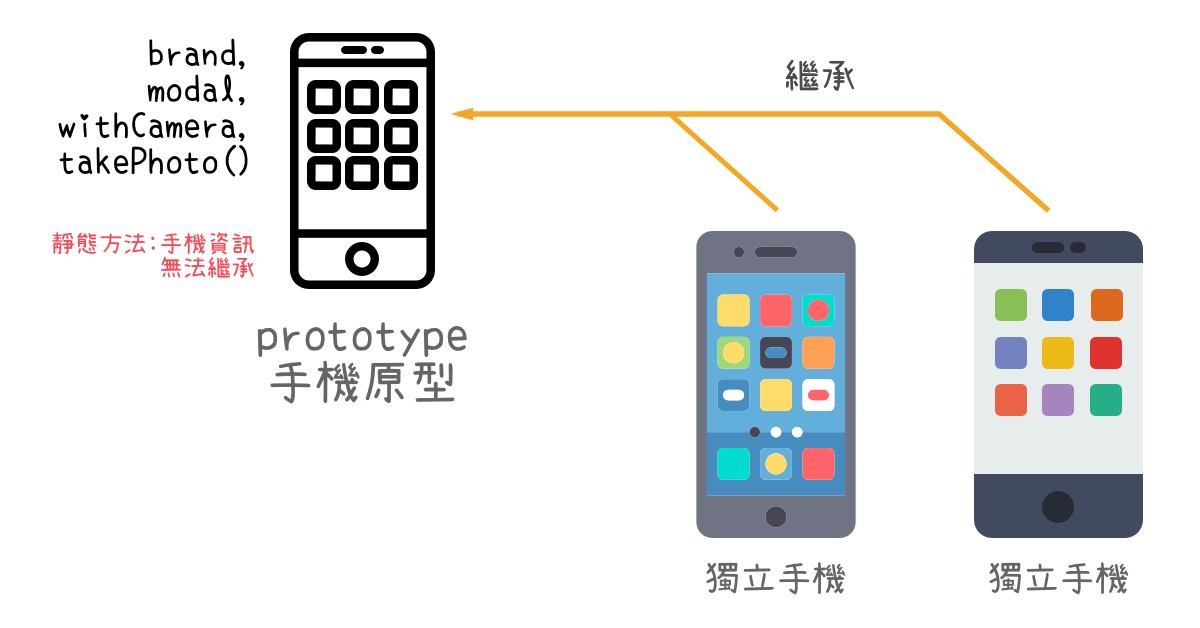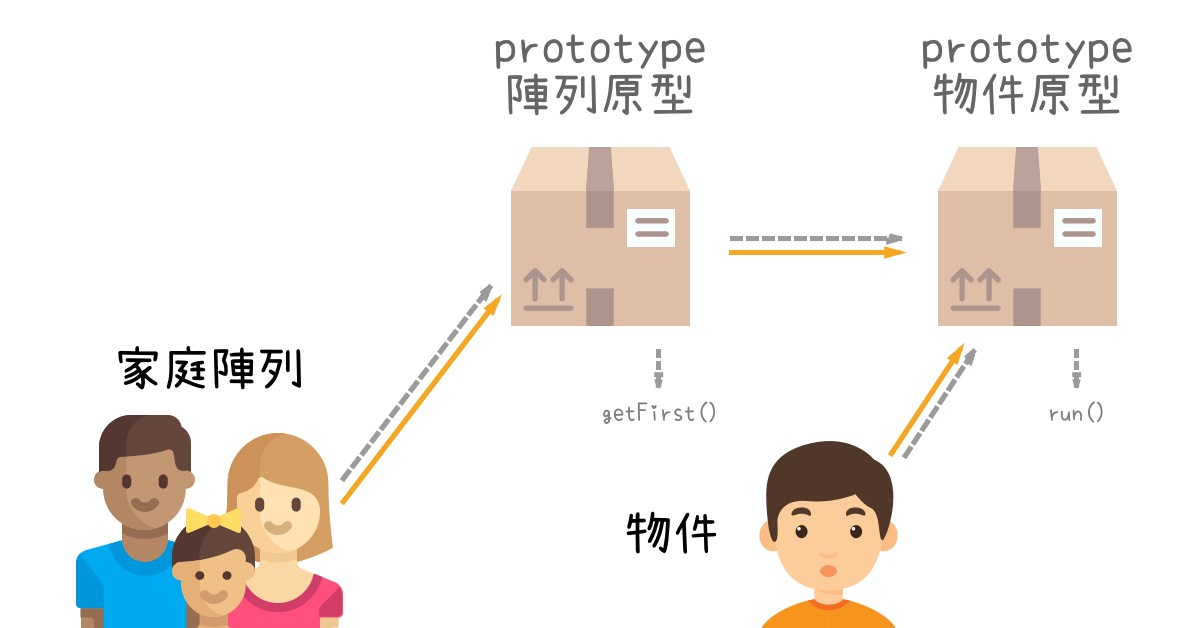ES6 建構式語法糖
這一段與先前介紹的建構式概念接近連結,單篇觀看可能無法理解為何 JavaScript 要加入 Class 的概念,而 Class 在 JavaScript 只是個語法糖,讓建構式及原型更容易被表現而已。
ES6 建構式
這裡我們先將先前章節的程式碼整理過來,除了順序有些調換外,觀念上是沒有差異的,最後產生的值包含了物件屬性及原型的方法。
1 | function PhoneTemplate(brand, modal, withCamera) { |

接下來使用 class 來改寫,你可以對應著上方的原始碼與下方的一起看,僅有三個小地方要稍作修改:
function PhoneTemplate定義名稱 -> class PhoneTemplate- 初始化物件屬性寫在
constructor ()內,一個 class 也只能有一個constructor。 - 原型方法直接寫在 class 內就可以了
1 | // ES6 Constructor |
結果:
constructor定義了原本在物件內的屬性及值,其中也包含外部傳入的參數。- 原型原本是
prototype的方法,在 Class 的類別方法是直接寫在constructor的後方,這樣的好處讓程式碼閱讀更為容易。
static 靜態方法
靜態方法屬於原型專屬的方法,它並不會繼承到物件上。像是陣列原型中有一個 of() 的方法,但一般陣列是無法使用專屬於原型的陣列方法。
1 | Array.of(1,3,4,5,6); // [1, 3, 4, 5, 6] |

靜態方法只能被原型使用,無法在創立的物件上使用。
1 | class PhoneTemplate { |
Setter, Getter
Getter, Setter 顧名思義,一者是傳入、另一則是讀出,兩者可以同時對 “相同的變數” 進行操作,如以下範例來說,我們可以傳入 1,但讀出為 2。set 同時修改傳入的變數,讓 get 的資料不同。
1 | // ES6 Constructor |
另外特別是傳入的方式是使用 等號,而不是 function 的參數。
- 如果只有 getter 則不能修改
- setter 則只能傳入一個參數
ES6 建構式 + extends
先前已經使用一個建構式建立基本的原型,在先前我們也有提到,原型概念中還有一個是原型鍊。也就是原型可以不斷地繼承,但到目前為止的範例我們都只有創造一層原型。

手機模板是一個基本的原型,這個原型不夠使用時我們可以在上新增方法,但有些時候我們擔心會干擾到其它已建立的原型,我們可以使用 extends 來擴增新的方法。
有個品牌總是要做出最屌最潮的手機,他可以以目前手機作為基礎再加以擴增。
這裡會看到兩個新的單字 extends、super:
extends: 繼承於另一個原型之下super: 使用上層的值(屬性)1
2
3
4
5
6
7
8
9
10
11
12
13
14
15
16
17
18
19
20
21
22
23
24
25
26
27
28
29
30
31
32
33
34
35
36
37
38// 第一層
class PhoneTemplate {
constructor (brand, modal, withCamera) {
this.brand = brand;
this.modal = modal;
this.withCamera = withCamera || false;
}
takePhoto () {
if (this.withCamera) {
console.log(this.modal + ' 照相');
} else {
console.log(this.modal + ' 這台沒有照相功能');
}
}
callSomeone (someone) {
console.log('打通電話給 ' + someone);
}
};
// 利用上一個建構式作為延伸
class ApplePhone extends PhoneTemplate {
constructor (brand, modal) {
super(brand); // 繼承原本的建構式中的變數
this.modal = 'iPhone'; // 直接賦予變數
}
// 直接寫入新的方法
hiSiri () {
console.log('hi Siri');
}
}
var iPhone = new ApplePhone('Apple');
console.log(iPhone); // 這個與先前的建構式有接近的格式
iPhone.takePhoto(); // 由於沒有傳入相機功能,所以沒辦法
iPhone.callSomeone('小明'); // 能使用上一個建構式的方法
iPhone.hiSiri(); // 能使用新建構式方法
這個概念下也能夠繼承於現有的原型,如以下範例就是將 MyPhones 繼承於 Array 之下,這種繼承方法可以讓新的建構式擁有陣列的全部方法,也可以藉此增加新的方法。
1 | class MyPhones extends Array { |
JavaScript 中許多觀念很重要,其中之一則是原型。許多時候一些語法上的錯誤或是概念一時轉不過去,打開 console 看看物件的圓形,或許就能明白。
另外…,剩兩篇了!?